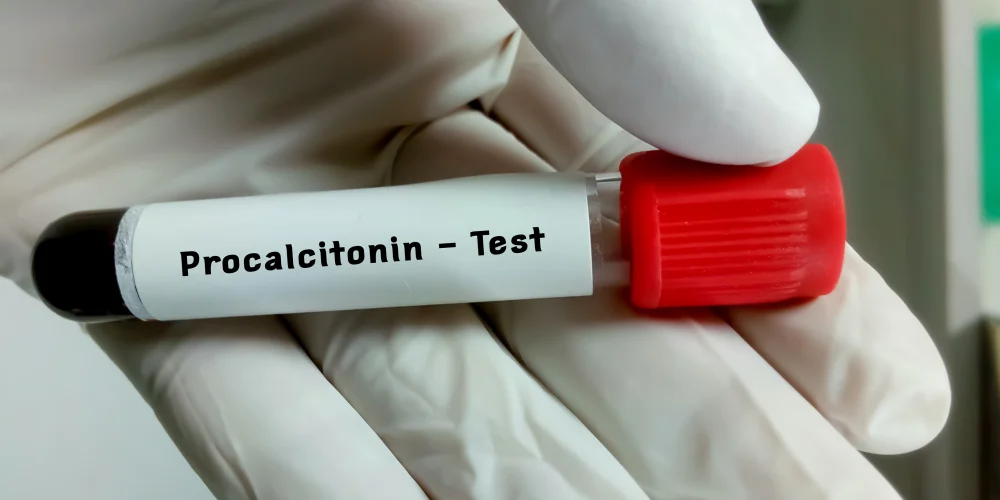Procalcitonin Test
Assessment for Bacterial Infections and Sepsis
Procalcitonin test is a sophisticated diagnostic instrument that measures procalcitonin levels in bloodstreams. Procalcitonin is an peptide precursor to the hormone calcitonin that is produced normally in low amounts. In the case of bacteria-related infections, especially severe ones such as sepsis, the body increases the production of procalcitonin. This is why Procalcitonin levels are a vital biomarker to detect the early signs of bacterial infection and distinguishing the bacterial infections from viral ones, which are typically in the low range. The test assists healthcare professionals in making educated decisions regarding treatment with antibiotics, helping prevent the unnecessary treatment with antibiotics for viral infections as well as providing prompt treatment for bacteria, thus improving the outcome of patients. Results are generally available fast and allow for prompt medical intervention depending in the extent of the infection determined by Procalcitonin levels.

When is the PCT Test Prescribed?
Procalcitonin Test is a test that can be used to determine the Procalcitonin Test is prescribed in different clinical scenarios:
- Diagnosis of Sepsis : It helps differentiate between bacterial sepsis and other causes of systemic inflammation, aiding in early diagnosis and appropriate treatment.
- Antibiotic Stewardship : To guide antibiotic therapy decisions by assessing the severity and progression of bacterial infections.
- Monitoring Response to Treatment : It monitors the effectiveness of antibiotic therapy and helps determine when to discontinue treatment.
Preparation for the PCT Test
There is no special preparation needed to take Procalcitonin Test. Patients are able to consume food and drink as usual prior to the test. A blood sample will be taken via Venipuncture.
Parameters Considered During PCT Test
Procalcitonin Test an important diagnostic tool that determines the level of procalcitonin in bloodstream. Procalcitonin is a precursor for the hormone calcitonin, mostly produced in response to bacteria-related infections. Procalcitonin levels that are elevated frequently signal severe bacterial infections such as sepsis. This helps healthcare professionals differentiate between bacteria-related infections as well as various other sources of inflammation. This test is crucial for clinical situations, as it guides the appropriate and timely treatment of antibiotics. By monitoring the Procalcitonin levels in conjunction with symptoms of clinical nature as well as other indicators of diagnosis healthcare professionals can efficiently combat infections, monitor the response to treatment and modify the treatment strategies if needed. PCT tests are particularly useful in the context of Procalcitonin test is especially useful in the field of emergency healthcare and intensive medical care where quick diagnosis and treatment choices are vital to the patient’s recovery and outcomes.
Time Required for PCT Test Report
The time it takes to receive the report from the Procalcitonin test is typically dependent on the laboratory used and the test method employed. The results typically are accessible within a couple of hours to a full day. In situations of emergency, advanced labs may be able to give results in a couple of hours. For exact time frames, it’s recommended to contact the healthcare professional or laboratory performing the test.
PCT Test Price
In Chirayu Super Speciality Hospital, the Procalcitonin Test price 3500 rupees, which allows access to the most crucial diagnostic tests for bacteria-related infections.
Book an Appointment for PCT Test
Making an appointment for the Procalcitonin Test at Chirayu Super Speciality Hospital in Bhayandar is easy. Our pathology lab in Bhayandar allows patients to conveniently book their test online via the hospital’s website or by contacting the customer service team for assistance.
What Our Patients Say
Hear from our valued patients about their experiences at Chirayu Super Speciality Hospital and how our care has made a positive impact on their health and well-being.


Excellent healthcare professionals providing comprehensive infection testing.


Prompt and courteous service during my appointment.


Peace of mind knowing I received quality healthcare for my PCT Test.


Accessible and reliable healthcare service at Chirayu Super Speciality Hospital.


Clear explanations and quick results for my infection diagnosis.


Accurate diagnosis and timely treatment thanks to the PCT Test at Chirayu Hospital.
Frequently Asked Questions
Here, we provide answers to some of the most commonly asked questions to help you better understand our services, policies, and facilities. If you have any additional questions, please do not hesitate to contact us.
Elevated PCT levels indicate bacterial infections, helping healthcare providers differentiate between bacterial and viral causes of inflammation.
The PCT Test guides antibiotic therapy decisions, reducing unnecessary antibiotic use and minimizing antibiotic resistance.
No, the PCT Test specifically indicates bacterial infections and is not useful for diagnosing viral infections.
Yes, elevated PCT levels are indicative of sepsis caused by bacterial infections, aiding in prompt diagnosis and treatment.
The frequency of PCT testing depends on the clinical condition and response to treatment, as determined by the healthcare provider.